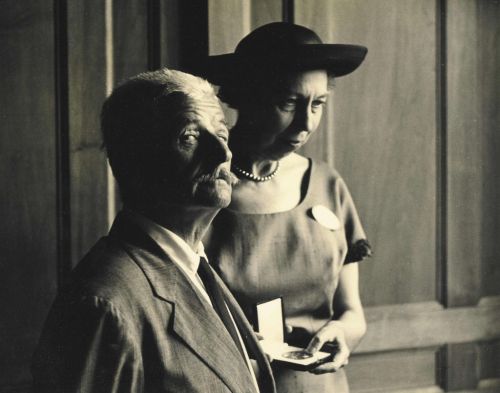







Vilijam Fokner o svom romanu Buka i bes / William Faulkner on his novel Sound and Fury
.
.
Vilijam Fokner izgovara reč Yoknapatawpha / WIlliam Faulkner pronouncing Yoknapatawpha
.
.
Unidentified participant: Mr. Faulkner, what do you consider your best book?
William Faulkner: The one that—that failed the most tragically and the most splendidly. That was The Sound and the Fury—the one I worked at the longest, the hardest, that was to me the—the most passionate and moving idea, and made the most splendid failure. That’s the one that’s my—I consider the best, not—well, best is the wrong word—that’s the one that I love the most.
Unidentified participant: I wanted to ask something about [that]. Was it very difficult to write the stream-of-consciousness [part of] Benjamin?
William Faulkner: No, no. Not—not once I understood Benjy and understood the story. It was very simple, very easy.
Unidentified participant: That’s such a difficult part to understand unless someone shows you —
William Faulkner: No, it was very easy to do. That’s probably why it’s so hard to read. I think anything that is easy to do is—is per se probably bad [audience laughter], but I couldn’t think of any better way to tell about Benjy. I was trying to tell a story. I tried that way. That wasn’t enough. I tried with Quentin. That wasn’t enough. I tried with Jason. That still wasn’t enough. And then I tried Faulkner and that still wasn’t enough. [audience laughter] It still failed, and that’s why I love it.

Unidentified participant: Mr. Faulkner, do you ever consciously base your—any of your characters, either major characters or minor characters, on people you find in every-day life. For example, during your time spent in Charlottesville, could you possibly incorporate someone who lived here into one of your major books, as a conscious exercise?
William Faulkner: I will very likely do it, but not as a conscious exercise. The writer is completely amoral. He—he will use experience. He will rob from other writers. He will take from life, but he is—is trying to create a character of his own, and so very likely in time, I will—will need someone I have seen in Charlottesville, Virginia, and will without any compunction use him.
Unidentified participant: Sir, in some of your stories, you’ve used scenes wherein two or more people are sitting around or across from each other at a table or a desk, in a very dark room where perhaps only the hands can be seen in the lighting. I was wondering if that sort of scene meant anything to you, or that you felt that you could use that particular scene for a certain type of information in your story, or just what?
William Faulkner: I think maybe instinctively I like understatement. Maybe I—I have a feeling for—for somberness. Probably I do, but I—I do like to—to tell things as simply by—by understatement, to—to tell—to show just the—the surface with—with the dark implications behind it of an instance [or] scene.
Unidentified participant: Did you expect to write a [any more] poetry? And if so, are there any particular subjects you’d [like to see in your poetry]?
William Faulkner: I’m a failed poet. I consider myself a failed poet. I’ve tried to be a poet, and I couldn’t be a good one, and so I did the next best thing which I could do, but I’m still a—a failed poet, but what I write is—is, in my opinion, poetry.

